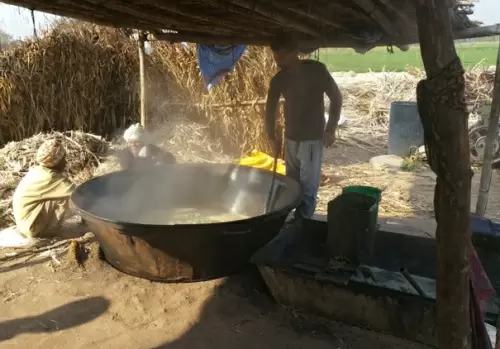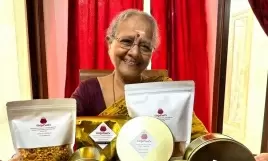“The air around the place where gur is made smells sweet too"
23-January-2016
Vol 7 | Issue 4
Driving along highways in Punjab during this season can be a sweet and interesting experience - literally that is!
With hundreds of 'gur' (jaggery) manufacturing units lined up near the sugarcane fields along the highways, it seems like a real sweet-time for farmers and people who stop there to taste the freshly prepared 'gur' and 'shakkar' (powered gur).
 |
|
Gur is made by boiling sugarcane juice in a big iron utensil on firewood and constantly churned till it thickens. It is then left to cool and harden (Photo: IANS)
|
At several places in the sugarcane growing belts of Punjab, cars, buses and other vehicles can be seen halted at places where local farmers are making the fresh jaggery.
"We all like to have gur and shakkar, especially in the winter months. To have it so fresh is a different experience altogether. It is also nice to see the farmers make it in front of you," said Anuradha Verma, a software professional who stopped at one of the gur units with her mother near Chunni village, 30 km from Chandigarh.
People can be seen tasting the gur and shakkar, which is put up by the farmers on makeshift tables. Most of them buy stocks for their homes.
"The very sight of gur and shakkar is attractive and many motorists stop to taste it and buy it for later use. The air around the place where gur is made smells sweet too," Verma said.
Farmers who grow sugarcane too are happy to set up the makeshift manufacturing units on the agricultural fields along highways.
"This activity lasts for over one month in winter. It is good business for us, but we have to face competition from other farmers too. At some places, the gur units are located very close. It takes half a day to convert the sugarcane into jaggery," said farmer Gurwinder Singh at his farm near Sirhind town.
The farmers are happy to share their produce with the people.
"People love to taste the freshly made gur. Some even want to taste the hot gur from the large tray where it is put for drying up. We give an adequate sample for tasting and we don't charge for it," farmer Kirpal Singh said.
The price of gur and shakkar ranges from Rs 40 to 60 per kg. The gur available is in two varieties - plain and with 'saunf' (fennel).
Farmers use basic equipment and raw material to make the gur from sugarcane. The sugarcane juice is boiled in a big iron utensil on firewood and constantly churned till it thickens. It is then left to cool and harden.
One last thing: You don't need a sweet tooth to enjoy the gur and shakkar. So, go ahead and indulge! - IANS
















